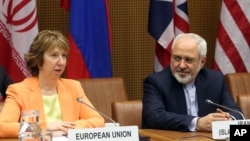Negotiators for Iran and six world powers have adjourned what they called "substantive and useful" talks on Tehran's nuclear program and said they will resume April 7 in Vienna.
European Union foreign policy chief Catherine Ashton read a joint statement Wednesday saying the discussions addressed Iran's uranium enrichment program, the country's planned Arak heavy water reactor and Western sanctions against Iran.
She gave no further details.
A senior U.S. official told Reuters it would be very difficult to overcome differences between Iran and the six world powers over uranium enrichment and the Arak reactor, which Western powers fear could yield weapons-grade plutonium.
But he said all parties aim to keep to their 6-month deadline to reach an agreement.
Iran and the group made up of the United States, Britain, China, France, Russia and Germany reached an interim deal last year for Iran to curb its most sensitive nuclear activity in exchange for limited sanctions relief.
A large group of U.S. senators is calling for a set of "core principles" it wants to see in a permanent deal.
In a letter to U.S. President Barack Obama, 83 senators said Iran must understand there will be consequences for not reaching "an acceptable final agreement," including "much more dramatic sanctions."
The senators said Iran must not be allowed to work around the sanctions that are still in place while the negotiations continue. The measures have hurt Iran's economy, and Iran wants them fully repealed as part of the final deal.
The letter also stated that Iran "has no reason" to have enrichment facilities like its Fordow site or the Arak heavy water reactor.
Western nations want to ensure that Arak, which is still under construction, is modified sufficiently to ensure it poses no bomb proliferation risk. Iran insists the facility must be free to operate under any deal, saying it will be geared solely to producing radio-isotopes for medical treatments.
The West suspects Iran intends to use its uranium enrichment program to make nuclear arms, which Iran has also repeatedly denied.
Some information for this report was provided by AP, AFP and Reuters.
European Union foreign policy chief Catherine Ashton read a joint statement Wednesday saying the discussions addressed Iran's uranium enrichment program, the country's planned Arak heavy water reactor and Western sanctions against Iran.
She gave no further details.
A senior U.S. official told Reuters it would be very difficult to overcome differences between Iran and the six world powers over uranium enrichment and the Arak reactor, which Western powers fear could yield weapons-grade plutonium.
But he said all parties aim to keep to their 6-month deadline to reach an agreement.
Iran and the group made up of the United States, Britain, China, France, Russia and Germany reached an interim deal last year for Iran to curb its most sensitive nuclear activity in exchange for limited sanctions relief.
A large group of U.S. senators is calling for a set of "core principles" it wants to see in a permanent deal.
In a letter to U.S. President Barack Obama, 83 senators said Iran must understand there will be consequences for not reaching "an acceptable final agreement," including "much more dramatic sanctions."
The senators said Iran must not be allowed to work around the sanctions that are still in place while the negotiations continue. The measures have hurt Iran's economy, and Iran wants them fully repealed as part of the final deal.
The letter also stated that Iran "has no reason" to have enrichment facilities like its Fordow site or the Arak heavy water reactor.
Western nations want to ensure that Arak, which is still under construction, is modified sufficiently to ensure it poses no bomb proliferation risk. Iran insists the facility must be free to operate under any deal, saying it will be geared solely to producing radio-isotopes for medical treatments.
The West suspects Iran intends to use its uranium enrichment program to make nuclear arms, which Iran has also repeatedly denied.
Some information for this report was provided by AP, AFP and Reuters.











